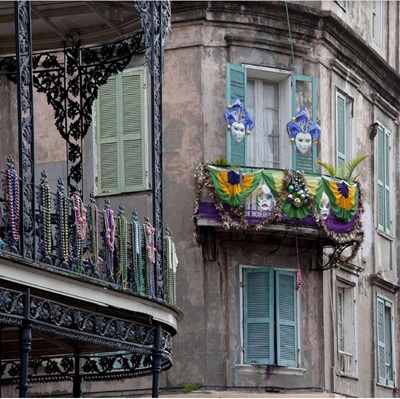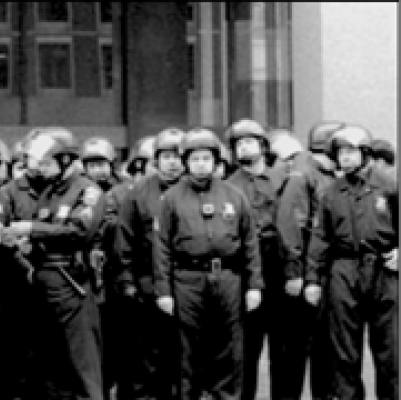.
.
New Short Fiction Award
Three times a year, we award a writer who submits, in our opinion, the best original, previously unpublished work.
Aishatu Ado, an Afro-German Peace Technologist living in Cologne, Germany, is the winner of the 68th Jerry Jazz Musician New Short Fiction Award, announced and published for the first time on April 3, 2025.
.
.
___
.
.
photo via The Met

.
.
Saharan Blues on the Seine
By Aishatu Ado
.
…..Aminata wakes with sand in her mouth and Paris under her cheek. The grit coating her tongue tastes of home—of spice and lingering sorrow. The copper tang floods her mouth; even in sleep, her body fights phantoms. Beyond the thin walls of her cramped Montmartre apartment, the city stirs to life. Moussa’s laugh, a ghost with teeth, tears through the veil of dawn, summoning shards of a desert sun, the acrid smell of burning instruments. Car horns blare below, an impatient hymn to morning.
…..The ngoni in the corner watches, its quiet presence a reminder of Mali, of headlines screaming of bloodshed, and of her grandmother’s tales of borders drawn by distant hands.
…..With a groan, Aminata pushes herself up, nightgown sticking to her skin like a lie. Her feet ache, memory-bruised. How many times has she sleepwalked through Paris, chasing ghosts that no one else sees?
…..As she stares out the small window at a market setting up—where a vendor roasts lamb—the scent carries her briefly back to Timbuktu, to evenings around a fire with Moussa. Then the kettle’s whistle snaps her back.
…..The open door gapes like a wound. She never locks it anymore. The memories she’s running from live inside her skin.
…..Then she hears it again. Laughter—Moussa’s laughter—skipping across dunes and defying borders. Aminata blinks, tears blurring the faded paisley wallpaper and worn oak floorboards. The memory hits like a sandstorm, erasing years and miles. In that moment, his warm hand seems to brush against her skin, and the pull of his absence grows impossible to ignore.
…..The urge to run builds in her legs, but there’s nowhere to go. Paris, with its cobblestones and wrought iron, traps her. Aminata takes a shuddering breath, willing the memories to recede. But they cling like burrs, stubborn and sharp.
…..She dresses quickly, fingers fumbling with buttons. She needs to get out, to outrun the memories. She steps into the metro, letting the crowd swallow her. Even here, amidst the clatter and babble, the past intrudes. Rokia Traoré’s “Nuit de Printemps,” swells in her ears, the ethereal vocals intertwining with the fluid, jazz-inflected guitar lines. Moussa’s phantom hand is warm in hers. She gasps, startling her neighbor. The woman shoots her a curious look before turning away. Three years in this place, and still, she can’t call it home. It is merely a pit stop—a place where discarded identities hang in her closet, waiting to be abandoned. Even her half-hearted decor—a tribal mask here, a faded tapestry there—reminds her of transience.
…..Back in her apartment, Moussa’s laughter grows louder, seeping into the cracks and reverberating in the rattle of pipes. It paints the walls with memories, turns shadows into familiar silhouettes. The ngoni shivers, its strings humming a lament for a lost homeland. Aminata presses her palms to her ears as the sound invades her mind. Her raw-boned frame sways, a reed in the harmattan wind. Once, Moussa’s laughter had been a promise; now it is a persistent echo, an unsolvable equation: present + absent = Moussa.
…..Drifting into the kitchenette, she fills the kettle once more, her trembling fingers lighting the stove. She tries to shake him loose—like grains of sand slipping through her fingers—but he clings. Can one be homesick for a person? Can the act of forgetting etch a name deeper?
…..Scared of facing her memories head-on, she skirts the ngoni, its drum-like membrane echoing reminders of what she fled. Did she run from Mali, or was she forced to? In Paris, she built a fortress of forgetting, but its walls are crumbling.
…..Each morning unfolds like a tableau vivant: Aminata forces herself through the motions of readying herself for work. Her hands move on autopilot – braiding her hair and buttoning her blouse. At Café de l’Alma, the barista’s smile feels obligatory, his eyes treating her like a fleeting shadow. Conversations drift by in French, seductive yet indifferent, leaving her soul parched.
…..Boarding the metro, she is wedged between strangers. Her afternoons vanish in a cluttered office where her own words lie unsaid. Every curt nod, every rustle of a newspaper, is a reminder of a life she cannot quite stitch together.
…..The ngoni calls, a siren song she cannot resist. Only one touch, she resolves, is enough to quell the longing. Only then does a news headline on her phone shatter her fleeting calm: “Historic Sites in Timbuktu Destroyed by Islamist Rebels.” Mausoleums reduced to rubble. A strangled sound—half sob, half scream—escapes her. Around her, life continues, oblivious. All she sees is destruction, erasure; the past turning to dust.
…..In the following days, memories crash in like a relentless tide. At work, her mind drifts and her translations falter. At night, she paces, heart racing, mind in knots. Sleep, when it comes, is a battleground of nightmares: Moussa’s blood, burning manuscripts, the silence after music dies.
…..Then, a single note splits her Parisian life in two: Before. After. Suddenly, she is elsewhere. Essakane—a village two hours from Timbuktu—arrives uninvited. Her cramped apartment dissolves; desert sands mix with spice and woodsmoke. The air thickens, pregnant with history.
…..In an instant, she is back at the Festival in the Desert, where drums and voices wove defiance into the night. For one breathtaking moment, Aminata is whole again.
…..Her body remembers even as her mind tries to forget. She dances, sweat streaming down her spine like a revived river, as the ghosts of the lost rise in the music. There—amid the artists with dust in their hair—stands Moussa, his spectral smile flashes bright as a newly minted coin.
…..Terror and longing intertwine as she wonders, “Am I losing my mind, or have I finally come undone?”
…..She squeezes her eyes shut, yet when she opens them, Essakane persists, singing in voices she once tried to silence. The music swells until it drowns out all else. Aminata tries to run, but her feet are rooted in sand that used to be her apartment floor. At the heart of it all appears Néné —her grandmother’s ghost, radiant in an indigo boubou rippling in an unfelt wind. Néné’s eyes, deep as desert wells, hold the weight of centuries. Aminata sees empires rise and fall in them, Mali in bloom and decay.
…..“Ahul,” Néné says, her voice a cool oasis. “You’ve come back to us.”
,,,,,Néné’s form multiplies, a mirror of every woman who has borne unbearable burdens. “We are unsilenced, unbowed, unbroken. You carry us within you. Now, sing the song you fear. Let your voice shake the world.”
…..Around her, Mali unfolds in a time-lapse: acacias in bloom, the distant cry of a nightjar, the whisper of millet fields in the wind. What if remembering is not destruction, but creation? What if Moussa’s memory is a seed waiting to bloom?
…..Desert blues notes burst from Aminata’s mouth, sharp and jagged. Her song turns to screams as the past returns:
…..In a violent flash, armed men from the Jama’at Nusrat al-Islam wal-Muslimin storming Essakane—faces hidden, voices shouting “No music!”—smashing koras and balafons, burning electric guitars, and Aminata ran, lungs burning, from her world exploding in gunfire and crack-boom-wails, from the silence-bringers, the joy-killers, from Moussa’s blood warm and sticky on her hands, his final words a death rattle in her ears, “run Aminata run”, and she ran, feet pounding sand then concrete then ocean, the weight of survival crushing her chest, guilt riding her back like restless djinns, and always, always the memory of rough hands that grabbed, groped, tore at clothes-flesh-dignity, fetid breath on her neck, Moussa’s fists flying, saving her only to die, and she couldn’t save him couldn’t save anyone, so she ran from a culture ground to dust under boots and twisted ideology, from home-that-was-no-longer-home, from self-that-was-no-longer-self, from joy-turned-ash and laughter-turned-silence, she ran and ran and ran until the running became who she was.
…..She always hears her own footsteps, running running running. Each step a betrayal, each mile carving a fresh wound in her soul.
…..Then, the familiar chaos of Paris intrudes—car horns slicing the air, each blare asking: “Who the hell are you? Why you here?”
,,,,,Aminata nods through tears. “I thought I was protecting myself. But forgetting’s just another way to die.”
…..“Oh, child. You can’t forget what lives in your bones, what sings in your blood. You can only choose to listen.”
…..The ghostly festival fades; dancers dissolve into mist, music dying like a weak radio signal. Aminata clutches her grandmother, desperate. “What do I do now?”
…..“Sing, ma petite. Sing until the world remembers how to listen.” In that moment, she hears Ali Farka Touré’s guitar weep about pirogues crossing rivers.
…..Aminata blinks —and she is back in her Paris apartment. The ngoni, warm with tears and life, rests in her hands. Drained yet determined, she walks to the open window. For a heartbeat, she stands at the crossroads of Rue de la Liberté and Rue de l’Exil.
…..Taking a breath that tastes of courage and sand, she flings the window wide. Paris floods in: the aroma of fresh bread, the rumble of the metro, a neighbor’s radio serenading “La Vie en Rose”.
…..Aminata lifts the ngoni and begins to play. The first notes are shy, tentative, but soon each bold, resolute stroke declares: I will not be erased, I will not be silenced.
…..Every string sings of Essakane, Moussa, Néné—of the girl she was and the woman she has become, suspended between remembering and forgetting, between running away and coming home.
…..As the sun climbs higher, Paris sheds its grey like old skin. Her music transforms into a manifesto: loud, unyielding, and resolute.
…..Aminata lowers the ngoni, arms aching, heart pounding. She marvels at these little half-moons of moisture on the floorboards, already fading. How the body weeps in unexpected ways, how grief, once transformed, can nourish like rain on parched earth.
…..The ngoni sings and Paris listens. Suddenly Aminata is everywhere: a grain of sand in the Sahara, a raindrop in the Seine —a story that refuses to end, a song that will not die.
.
.
___
.
.
.

Aishatu Ado is an Afro-German Peace Technologist, writer and poet who advocates for social justice. She is an alumna of Tin House, VONA, Hurston/Wright, and Roots Words Wounds fellowships among others. As a visual & literary artist, she weaves transformative Afro-feminist cosmovisions, channeling ancestral oral traditions & mythologies. Aishatu is featured in anthologies such as “Parables of AI in/from the Majority World” and “Mythic Winter: A Science Fiction and Fantasy Anthology.”
Click here to visit her website
.
___
.
.
Click here to help support the continuing publication of Jerry Jazz Musician, and to keep it ad and commercial-free (thank you!)
.
Click here to read “Bluesette,” Salvatore Difalco’s winning story in the 67th Jerry Jazz Musician Short Fiction Contest
Click here to read more short fiction published on Jerry Jazz Musician
Click here to read The Sunday Poem
Click here for information about how to submit your poetry or short fiction
Click here for details about the upcoming 68th Jerry Jazz Musician Short Fiction Contest
Click here to subscribe to the Jerry Jazz Musician quarterly newsletter (it’s free)
.
.
.
___
.
.
Jerry Jazz Musician…human produced (and AI-free) since 1999
.
.
.













































As I read the end of this piece, tears come to my eyes. A shifting of something broken in my heart from the loss of my father, feels mended. Aminata’s story, a story of grief, of guilt, of PTSD, is so powerful. There is a gentle violence in your interweaving of the present and the past that takes us on a whirlwind journey. I could taste the sand, I could hear the Essakane, I could feel Aminata’s heart beating in my chest. Absolutely beautiful. Congratulations Aishatu, a much deserved and earned win. Brava! And: Encore! 👏🏾
Wonderfully evocative writing. The intensity of feeling about loss and need to be belong were palpable. The resolution is both a way of recovering and preserving the past and their home, and a recentring in the present place and time. There’s a powerful series of descriptions about the problems of being an outsider in a foreign culture. Focused on the emotion weight of Aminata’s situation, it left me feeling about happy and sad. A worthy winner.
Absolutely stunning!
This is beautiful. Your writing is wonderfully poetic and appeals to all of the senses so vividly and intensely. And you portray Aminata’s inner world – her alienation, her grief, her longing – with such raw and powerful feeling. Thank you for sharing this story, and congratulations!
I just love the interweaving of music and musicality through the piece. It’s like it’s a character in itself.
Thank you for this beautiful story. From its blunt opening sentence to its resolution, boundaries – past and present, physical reality and memory, place, love and loss – merge, blend and break, then are suspended with the fabulous image of the crossroads of liberty and exile, and finally resolved with the assertion of life and presence, transcending self and reclaiming the music of the ngoni.
I love your brilliant lines and images – “feet pounding sand then concrete then ocean”, “the running became who she was”, Ali Farka Toure’s “weeping” guitar.
Beautiful. Congratulations.
My favorite line: “Let your voice shake the world.” Good advice for all of us. And the story gets better and better as it goes along. Well done!
Such an evocative piece. You set the scene so well and put the reader inside Aminata’s mind perfectly, so we felt every bit as much as she did. The grit was in my mouth upon waking, the ngoni calling to me. You made me become Aminata, made me live through not only a a turbulent time in her life, but in Mali’s history, as well. Not only that, you showed me what it would feel like to be a refugee, fleeing over the sand, the concrete, the ocean. Fleeing for my own life and trying to make a new place, one I never really wanted, my home. Heart wrenching. But you also showed the power in not denying your roots and knowing that in clinging to them, you do not become less than, no matter what anyone else says. There is power in the strength of generations past, the knowledge of your homeland, and it was a povitol moment when she realized that rather than a weakness, it was her strength to draw upon. You really brought a period of history and a type of life many people sadly have to live, to life and you taught me something in the process. Absolutely amazing writing. Well deserved award!!!
Absolutely stunning piece of writing, Aishatu. An emotional, harrowing read but packed with defiance and hope. A very worthy winner.
Such a powerful piece from Aishatu Ado! Aminata’s journey of unpacking how forgetting is just another way to die had me in a chokehold from beginning to end! Congratulations on a well-deserved win to the first Black person selected for the 68th Jerry Jazz Musician New Short Fiction Award!
Beautiful and powerful as always. Your writing speaks volumes. Congratulations!
first the multi sensory world building with deep intentional detailing swept me into a necessary narrative. The words poetic yes and they flowed like silk and tasted like honey and bitters and sours. As a refugee myself, Ananita’s story eventhough different is my story. The longing, the loss, the complications of belonging and complexity of ancestral connection is absolutely breathtaking. I am filled with useful hope in my own journey now that i can the spiritual growth in the agonizing process of migration. Aishatu thank you for teaching me how to embrace my aliveness in new lands.
Wow. I came here from Discord to support a fellow writer and certainly would have found something nice to say regardless of the story. But this blew me away. A stunning, visceral piece. Both heartbreaking and hopeful, written in a beautiful style that held me utterly spellbound from start to finish.
Mazel tov on the award–this story absolutely deserves it!
There is a movement in this story of verbal articulation and felt articulation. A collaborative effort beckoning me in with the first line, making Aminata’s trip to another plane almost natural given the tangible discordance of her experiences, and delivering a closure that lives on.
I love the use of sensory details in this story, especially the elements of texture and touch that are woven throughout. What a great read!
The imagery in this piece is gorgeous and carries so much emotion. A very powerful and beautifully written story.
“You can’t forget what lives in your bones, what sings in your blood. You can only choose to listen.” This sentence struck me. A moving story, thank you.
Aishatu Ado does not disappoint with this story! As I read, I could feel Aminata’s visceral grief as she came to understand how forgetting is “just another way to die.” As many of us navigate varying levels of Climate Grief, (Dis)ability Grief, Anticipatory Grief, Collective & Ancestral Grief, Disenfranchised/ Suffocated Grief, Carceral Grief, Movement Grief, etc., as we witness multiple genocides and outbreaks around the globe, this story feels like a salve for these times.
I really like the exploration and implications of memory explored here. The deepest memories are held in our bodies, in artifacts, and it is part of the journey to tap into them and re-invigorate ancestral history in new life.
I can feel every word, every intention, every emotion…beautiful is too small of a word for this writing. just wow.
I hung on every word. Thank you for the soul food, the delicious details that make up a real life away from the screens and the prompts and the machines. Beautiful.
This is so beautiful. Such interesting ways of describing memories, which feel so vivid and real. It made me think about things in a different way, which I really appreciate.
Amazing story! But again, like with the last several winners, it’s a published, well-known author. How are others meant to compete when any published author could enter? I know it’s an open contest, but still, it does seem a little unfair to the 99% of entrants who, you know, aren’t well-known figures in the modern world.
This is so beautifully told! You have an incredible craft for metaphor, and this entire piece is just gorgeously and evocatively told <3
The weaving of past and present, music and sound, is absolutely gorgeous. Congrats!
Love a story that introduces me to new people and cultures. Beautifully written!
Beautiful and vivid.
There is something very intimate and solitary about this piece in the beginning, which very intently begins to expand before very beautifully melding into a confluence of oneness. Like we are a witness to the inner unravelings of Aminata. Through this literary voyeurism is a mirror, pieces scattered for us to get a glimpse of ourselves and our own tangles. I’m grateful for the weaving and clear articulation of the duality of living both in presence and spirit and how on any given day we may be affected by either. And how this interconnectedness drives us to our purpose. Lean in to the mysticism of our gifts this story whispers. Even if it may be a road of grieving to get there.
The language is both melodic and percussive; it reminds me of the undulating call and response of jazz. No sensory detail is left out, and the feelings of loss and want are viscerally felt. The line “Then, a single note splits her Parisian life in two: Before. After.” stays with me. The rest of the piece reflects and refracts, over and over again, like a kaleidoscope. The images endure. Well done.